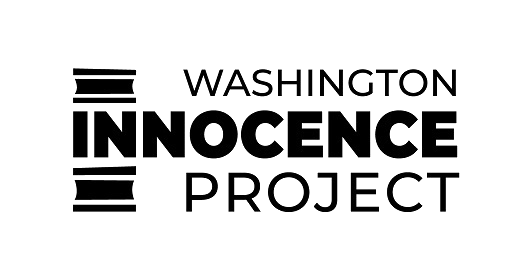Washington Innocence Project is an independent nonprofit organization that provides free legal services to men and women in Washington State who have been wrongfully convicted, helps prevent wrongful convictions through education and policy reform, and supports exonerees and freed individuals as they rebuild their lives in freedom.
How did Washington Innocence Project get started?
In 1997, Jackie McMurtrie founded Washington Innocence Project—then called Innocence Project Northwest—at UW School of Law as a volunteer project. It was the third innocence organization and second “Innocence Project” in the country. Jackie was inspired by the Frontline documentary “What Jennifer Saw,” which tells the story of a North Carolina man who spent 10 years in prison before he was exonerated of two rapes committed in the 1980s.
In the beginning, Washington Innocence Project was made up of a handful of volunteers investigating cases after receiving letters from inmates who were pleading for help. The organization’s first freed clients and exonerees were 11 men and women who were wrongfully convicted in connection with the infamous Wenatchee child abuse prosecutions. Jackie began teaching the Washington Innocence Project Clinic in 2002, and Policy Director Lara Zarowsky taught the Legislative Advocacy Clinic from 2011 – 2019. We now receive over 500 requests for legal assistance every year and continue to advocate with our pro bono partners on behalf of Washington’s wrongly convicted.
What is Washington Innocence Project’s relationship with the University of Washington?
We have transitioned from being a project of the University of Washington to an independent 501(c)(3) organization.
What is Washington Innocence Project’s relationship to other innocence organizations?
While we support and encourage each other, innocence organizations are financially independent organizations. We all provide free legal services to the wrongfully convicted and work to improve justice systems. Washington Innocence Project isn’t financially supported by the national Innocence Project or any other innocence organizations. We are the only innocence organization that serves Washington State—and the third innocence organization in the country to be established. To see a map of other innocence organizations, GO TO THE INNOCENCE NETWORK WEB PAGE.
Why did Washington Innocence Project become an independent nonprofit?
Our new status as a 501(3)(c) organization gives us more flexibility to raise funds, advocate for policies that could help prevent wrongful convictions, and grow to serve more innocent people. We will have more freedom to approach donors and apply for grants, with donations going directly toward freeing the innocent. Our new structure enables us to be stronger advocates, lobbying for policy change to prevent wrongful convictions, and signing onto amicus briefs in support of policies that align with our mission.
How is Washington Innocence Project funded?
Washington Innocence Project is primarily funded by private support from foundations, corporations, and individuals as well as by government grants. Washington Innocence Project receives limited support from the UW School of Law in connection with our clinical offering to students. We do not receive funding from the Innocence Project in New York City or any other innocence organization.
How are donations used?
The path to exoneration is long and costly—and gifts of every size help. Donations help us cover costs required to request documents for investigation, visit clients in prison, obtain DNA testing, consult forensic experts and more. The results from one DNA test, which can cost anywhere from $500 to $5,000 or more depending on the complexity of the case, can be life changing for an innocent person in prison.
How can I help free the innocent?
There are many ways that you can be a part of our work. VISIT OUR WAYS TO GET INVOLVED PAGE for the most up-to-date information about opportunities to volunteer and ways to be an advocate.
What is your organization’s privacy policy?
Our organization takes its privacy policy seriously and takes steps to protect and ensure the safety of our supporters. We do not sell or otherwise disclose information about our volunteers or supporters outside of our immediate organization. This policy has no exceptions. We do not sell or exchange your information with any other organizations, public, private or nonprofit.
How do I request assistance from Washington Innocence Project?
Washington Innocence Project provides free legal services to innocent prisoners in Washington State. VISIT OUR GET HELP PAGE to learn more and request an application.
Do you speak for clubs, organizations, or events?
We love telling our story and the stories of our freed clients and exonerees. CONTACT US WITH INQUIRIES.
Are there organizations doing similar work in other states and countries?
Yes! There are innocence organizations dedicated to freeing innocent prisoners around the world. To learn more, CHECK OUT THE INNOCENCE NETWORK WEBSITE.
How do people request assistance?
An innocent person serving time for a Washington State felony conviction may submit an application for assistance, available on our GET HELP page. Family and friends may also request that we send an application directly to an innocent person serving time for a Washington State felony conviction.
For assistance related to a conviction outside Washington State, FIND THE INNOCENCE NETWORK ORGANIZATION FOR YOUR JURISDICTION.
Can I submit an application on behalf of someone else?
Yes, but we always prefer receiving applications in the wrongfully convicted person’s own words. If it is easier for them to have assistance filling out an application, you can help. But, the person who was wrongfully convicted must sign the releases at the end of the application for us to begin our review.
If you have a loved one in a Washington State prison who has a claim of innocence, you can mail them an application through our site. Simply COMPLETE THE APPLICATION REQUEST FORM available on our Get Help page and we will mail the application directly to them.
Can you send someone in prison an application for me?
Of course! COMPLETE THE APPLICATION REQUEST FORM on our Get Help page and we’ll be happy to send a copy to them directly.
I mailed you an application. Why haven’t I heard anything?
You should receive a letter acknowledging receipt within 90 days. After that, the time and format of our response varies from case to case. Rest assured that we are evaluating your case to assess the best strategy for moving forward.
Can I talk to someone at Washington Innocence Project about my application or the application of a loved one?
Unfortunately, no. Washington Innocence Project has a small staff and does not have the resources to permit individual consults. If we have questions about an application, we will contact the prisoner directly.
How does Washington Innocence Project decide which cases to take?
To be considered for assistance, innocent people in Washington State who are wrongfully serving time in prison must meet the following criteria:
- Be wrongfully convicted of a state or federal felony crime in Washington State.
- No longer have a right to appointed counsel.
- Be unable to afford counsel.
- Have completed their direct appeals process.
- Have a claim of actual innocence that can be proven through DNA testing or other newly discovered evidence.
- Have no involvement in the crime whatsoever. We do not take cases where the claim is an affirmative defense, such as consensual sex, self-defense, or accidental death.
I meet all of your criteria. Why did my application get rejected?
Unfortunately, due to limited resources and strict legal constraints, we cannot pursue every case that meets the criteria listed on our website. Washington Innocence Project’s decision to accept or reject an application is not a judgment on the guilt or innocence of an applicant or a comment on the fairness of the legal proceeding.
Does Washington Innocence Project only take cases with DNA evidence?
Some innocence organizations, such as the Innocence Project in NYC, focus exclusively on cases with DNA evidence. Washington Innocence Project reviews, investigates, and litigates cases in Washington State with any newly discovered evidence, whether or not that evidence allows for DNA testing.
I don’t live in Washington. Who do I contact for information about innocence help in my state?
Washington Innocence Project is only able to provide legal assistance to innocent prisoners in Washington State. There are innocence organizations who help free the innocent around the world. THE INNOCENCE NETWORK is a great resource to locate an organization in your state.
What is an exoneration?
An exoneration is a case in which a person was wrongly convicted of a crime and later cleared of all the charges based on new evidence of innocence.
What is the difference between an exoneree and a freed client?
No matter what, two of the things that all of our exonerees and freed clients have in common are innocence and freedom.
According to the National Registry of Exonerations, an exoneree is “a person who was convicted of a crime and later officially declared innocent of that crime, or relieved of all legal consequences of the conviction because evidence of innocence that was not presented at trial required reconsideration of the case.”
Sometimes the justice system presents innocent clients with other options to leave prison and sacrifice their chance to ever be recognized as actually innocent. For example, if a prisoner accepts an Alford plea, they can be released from prison and maintain their innocence by admitting that the evidence the prosecution has would be likely to persuade a judge or jury to find the prisoner guilty. Often times freed clients accept these kinds of pleas so they can begin rebuilding their lives in freedom as they continue the legal fight to prove their actual innocence.
How long does it take to exonerate someone?
On average nationally, the innocent spend 14 years in prison before exoneration and release. Washington Innocence Project exonerees spent an average of eight years in prison before exoneration.
What is Washington Innocence Project’s stance on the death penalty?
We know all too well that innocent people go to prison. The Death Penalty Information Center has found that, since the 1970s, more than 165 people were sentenced to death before their exoneration. As long as the death penalty exists—or until we can guarantee that no one is ever wrongfully convicted—innocent people can be executed for crimes they did not commit. Additionally, racial bias in our justice system means that Black people are seven times more likely to be wrongfully convicted of murder than white people, and are given the death penalty at much higher rates. Therefore, the Washington Innocence Project opposes the death penalty.
Is Washington Innocence Project soft on crime?
No. We believe that people who commit crimes should be brought to justice, and that innocent people should not have to spend time in prison. Every case of wrongful conviction is a case of the true perpetrator escaping justice. In almost half of cases in which DNA evidence exonerated someone, that evidence has led to the actual perpetrator being convicted.

